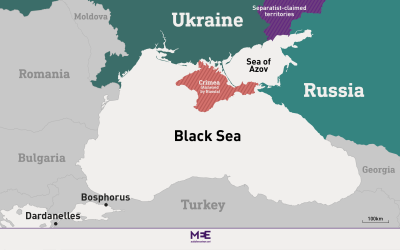Political risk insurers face $2 bn exposure to Russia-Ukraine war
By admin
U.K.-based consultancy firm Peel Hunt LLP estimates the insurance industry’s political risk exposure in Ukraine and Russia at $2 billion which could amount to sizeable losses for certain insurers.
According to several analysts, political risk, aviation war, trade credit, and marine cargo and war insurance lines are highly exposed to the ongoing war between Russia and Ukraine.
Analysts at Peel Hunt wrote about PRI: “This includes claims relating to expropriation, war, embargoes, and border closures due to government intervention. We anecdotally understand that the total insured limit for PRI insurance across Ukraine and Russia is c.$2.0bn (a very rough guestimate). Hence, whilst exposure seems manageable, even a single-digit share would be a sizeable loss for the market.”
Given the events of this week and the lines that the conflict may impact on, those same analysts wrote: “Given that markets have had some warning running into this conflict, insurers have had time to go through their exposures and either put them on notice or trigger any war exclusions.”
They added: “In Credit insurance, contracts can be pulled overnight. As such, insurers would have been able to take steps to limit any exposures they might have on their books.”
One mitigating factor, said Peel Hunt, is that Lloyd’s has a low exposure, about 15%, to Europe. Exposure to eastern Europe, the company said, will most likely be ‘modest’.
“As such,” they added, “it will be individual contracts written in the region by insurance syndicates that are likely to determine any specific exposure.”
Meanwhile, Peel Hunt said the energy market is relatively large and, at 4%, one of the core underwriting classes at Lloyd’s.
The analysts added: “The Energy market is likely to be disrupted should this conflict drag on for a number of months. The oil price had already been rising ahead of this conflict and Brent is now above $100/bbl. Our Oil & Gas team reports that production capacity is low due to underinvestment in infrastructure for a number of years.”
Other analysts have pointed to specific areas of the industry. Risk solutions firm Russell Group has pointed to the impact of the invasion on airlines.
An analysis from that firm said that low-budget airlines would be more affected than larger carriers. “Meanwhile,” the company said, “some (re)insurance carriers, like capital markets, are vulnerable to what the Ukrainian government infrastructure ministry describes as the “information field.”
They added: “This differentiation in the exposure to the Ukrainian crisis may ease the concerns of aviation (re)insurers who are scrambling to work out their exposure to Ukraine. Insurance coverage has already been pulled from Ukraine and with airlines now actively avoiding the country.”
They went on: “Ukrainian operators are facing operational disruption over a loss of insurance coverage because of the potential risk of armed conflict in the region. Budget operator SkyUp stopped selling tickets for flights from 14-16 February because aircraft lessors are ‘demanding the return’ of aircraft to the European Union.”
In response, Ukraine’s infrastructure ministry reportedly also announced a $590m fund to insure aircraft flying through the country’s airspace, amid reports that global insurers were suspending coverage due to the threat of a large–scale Russian attack.
Anna Tsirat, apparently a lawyer for Jurvneshservice, based in Ukraine’s capital of Kiev, has been posting updates to LinkedIn on the deteriorating situation. She wrote that many reinsurers submitted 48 hours notifications on cancellation of war risk insurance for Ukraine, beginning on 11 February.
She added: “KLM reacted the first and cancelled its flights to Ukraine on Saturday morning. SkyUp finished its Sunday international flight Funchal-Kyiv in Kishinev and transported passengers to Kyiv by bus. Since the 14th of February 2022, Ukrainian airlines have to quit the operation of leased aircraft insured abroad.”
It was for this, she wrote, that the Ukrainian Ministry of Infrastructure announced its fund to insure aircraft, although she quoted a slightly divergent figure than the above.
Cyber will be one area of the insurance industry that will come under scrutiny, since a cyberwar is thought to be taking place alongside the ground invasion. Australian insurer Honan said that many cyber policies contain the same exclusions around acts of war that exist in other insurance policies, even if insurers do not apply them to attacks from overseas ‘threat actors’.
It added: “Whether your business has cyber insurance cover or not, Australian businesses should be taking actions to limit their cyber risk exposures, including reviewing their IT security protocols and defence networks; ensuring a current and tested business continuity and disaster recovery plan is in place; ensuring a cyber attack framework is established, with a clear path to notifying brokers/insurers, engaging external cyber incident response managers, and notifying key internal stakeholders; reviewing all contracts with clients and suppliers for any “suspected breach” notification requirements, ensuring readiness to notify as necessary.”

